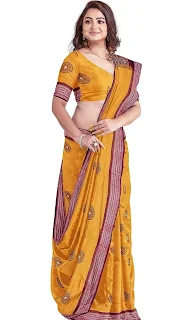Origin and History
The Bomkai sari, also known as Sonepuri sari, originates from Bomkai village in Ganjam district of Odisha. This type of sari has a fascinating history that dates back to the 8th century. According to legend, the erstwhile royal family of Odisha, the Bhanjas, played a major role in the development of this art form. The intricate weaving techniques and designs that define the Bomkai sari are said to have been mastered by the Bhanja rulers.
Designs of Bomkai Sarees
The shape of the fish is very popular because it is believed to be a symbol of success and prosperity. The Kumbha (water jar) row is one of the most popular border motifs in Bomkai Silk. Bomkai still maintains its original weaving techniques and has not completely changed to jacquard and dobby techniques like many other traditions. There are about a thousand families in Bomkai village, all of which are still dependent on various livelihood activities, including Bomkai weaving.
Types of Bomkai saris
Bomkai saris come in various styles, each with its own distinctive features: 1. Sonepuri Bomkai: This is the most traditional and classic form of Bomkai sari, characterized by its rich colors. and intricate motifs.
Pasapalli Bomkai: Named after the board game "Pasa", this variant features a unique pattern on the pallu and border, similar to a game board.
Barpali Bomkai: Hailing from the Barpali region, these saris are known for their intricate details and traditional designs. 4. Saktapar Bomkai: This style is influenced by tribal art and includes geometric shapes and tribal motifs.
Occasion and Significance
Bomkai saris have great cultural and religious importance in Odisha. They are often worn during special occasions, festivals and ceremonies. Many Odia brides also choose Bomkai saris as their wedding attire, reflecting tradition and elegance. Additionally, these saris are valued as heirlooms and are passed down through generations, preserving the heritage of Odisha. Modern Revival and Adaptation In recent years, Bomkai saris have become popular not only in India but also in the global fashion scene. Designers have taken the timeless beauty of Bomkai and incorporated it into contemporary fashion. This revival breathed new life into the traditional art, ensuring its continuation.








































0 comments:
Post a Comment